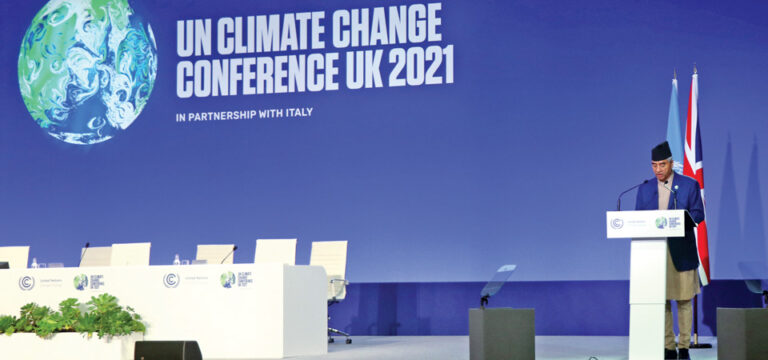
Prime Minister Sher Bahadur Deuba has raised concerns over the impact caused by climate change in the Himalayan region.
Addressing the World Leaders Summit during the 26th Conference of Parties (COP 26) of the UN Framework Convention on Climate Change (UNFCCC) in Glasgow, Scotland on Monday, Prime Minister Deuba said that rapid warming in the Himalayas had posed a serious threat to food, water, energy, and human security of the entire region.
“Thus, I urge world leaders to recognise the specific climate vulnerability of the high mountains and accord high priority to the mountain agenda in all climate-related negotiations,” said PM Deuba, stressing on keeping the global temperature below 1.5° C is vital for mountain people.
PM Deuba highlighted that Nepal would host Sagarmatha Sambad – a dialogue named after Mt. Everest, in order to raise awareness of the climate crisis in the Himalayas.
He said that Nepal, although a Least Developed Country, was making efforts sincerely to balance development and climate actions. “We have regulatory mechanisms to ensure that international climate finance is channeled to support transformational approaches in implementing adaptation, mitigation, and disaster management actions together,” said the PM.
Similarly, we are engaging all stakeholders including the private sector, indigenous people, disadvantaged communities, women, and youth in our climate actions, he said.
PM Deuba further went on to inform that the government had decided to create a dedicated institution for working on Nature Conservation and Climate Change together.
The PM also raised concerns over the loss incurred by the nation as a consequence of climate-induced disasters.
He asserted giving a place to the issue of loss and damages caused by climate-induced disasters under Article 4.8 of the Convention.
“We call upon the Parties to agree on making the loss and damage a stand-alone agenda for negotiations and support the framework of additional financing for it,” said PM Deuba, adding, “The COP 26 must ensure adequate adaptation aid for the most vulnerable countries by scaling up financial, technological and capacity-building support.”
He added that the goals could be achieved only via quick, direct, and easy access to climate finance.
PM Deuba further called the parties to agree on a clear roadmap for a new collective, quantified and ambitious goal on climate finance before 2025.
Moreover, the PM said that Nepal was firmly committed to the implementation of the Paris Agreement.
He said that Nepal had submitted an ambitious NDC that plans to decarbonise its economy in all sectors.
“Nepal aims to reach a net-zero emission by 2045 by ensuring that 15 per cent of the total energy demand is supplied from clean energy sources and maintain 45 per cent of the country under forest cover by 2030,” said the PM.
He also mentioned the recent approval of the Long Term Strategy on Loss and Damage and National Adaptation Plan.We have framed a policy to spend at least 80 per cent of the available climate finance to support local climate actions, said PM Deuba.
He added, “We are reaching the most vulnerable communities through our Local Adaptation Plan of Action.”
PM Deuba was of the view that with abundant water, forest, and biodiversity resources, Nepal could be a leader in sharing clean, green, and nature-based climate solutions in the region.
He said that increase in extreme climate events had caused a huge economic and ecological loss to precious human lives.
“Around 80 per cent of Nepal’s population is at risk from natural and climate-induced hazards,” he said, highlighting that in the last 40 years, natural disasters had caused close to US$ 6 billion physical and economic damages in our country alone,” he said.
He also expressed his belief that the decisions made at COP 26 should do justice to those affected now, the future generations, and Mother Nature.
PM Deuba also thanked the government of the United Kingdom for hosting the conference.
Source : TRN,






